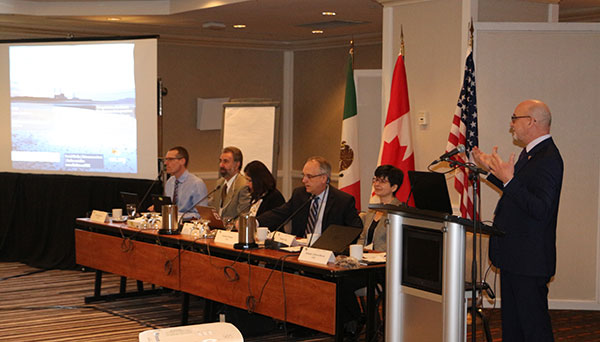Reunión pública de la Iniciativa RETC de América del Norte
Delta Hotel,
475 Avenue du Président-Kennedy,
Montreal, Québec
Canadá
25 y 26 de febrero de 2020
Público
Organizada este año en colaboración con el Taller para usuarios de datos del Inventario Nacional de Emisiones de Contaminantes (National Pollutant Release Inventory, NPRI) de Canadá, esta reunión congregará a representantes de la industria, gobiernos, organizaciones no gubernamentales e instituciones académicas, y ciudadanos interesados en la sustentabilidad ambiental en el sector industrial de América del Norte.
- Día 1 (a cargo del NPRI): se mostrará el trabajo de usuarios de datos del NPRI de nivel avanzado, con el objetivo de entender sus necesidades de información y cómo puede el registro mismo satisfacerlas con mayor eficiencia. Algunos académicos e investigadores ejemplificarán la manera en que utilizan los datos del NPRI y los vínculos que establecen con otros datos. Invitamos a usuarios de datos con cualquier nivel de dominio a presenciar la sesión.
- Día 2 (a cargo de la CCA): se explorarán aplicaciones actuales y posibles de los datos RETC de América del Norte, con miras a comprender con mayor claridad las necesidades de los diversos sectores de toda la región y atenderlas. Los participantes tendrán la oportunidad de escuchar a representantes de los RETC de Canadá, Estados Unidos y México, quienes ofrecerán una puesta al día de los respectivos registros; podrán, además, explorar posibles temas para su análisis en el próximo informe En balance; conocer las mejoras implementadas al portal En balance en línea de la CCA, sus datos y herramientas, y ofrecer sugerencias sobre un proyecto “desafío” en términos de prevención de la contaminación industrial a escala de América del Norte.
El acceso a la reunión es gratuito, pero el cupo es limitado y todos los participantes deberán registrarse. La CCA pone a disposición de los interesados que cumplan con las condiciones de participación apoyos económicos limitados para el pago de viáticos y alojamiento. La fecha límite para solicitar el apoyo económico es el 10 de enero de 2020.

Orden del día
25 de febrero: Taller para usuarios de datos del INRP
Objetivos:
- Entender las necesidades de los usuarios avanzados de datos NPRI (academia, investigación, gobierno), por ejemplo:
- ¿Qué datos NPRI utiliza esta audiencia?
- ¿Cómo obtiene y utiliza los datos?
- ¿A qué otro tipo de datos los vincula?
- Ilustrar la versatilidad del NPRI mostrando el trabajo de varios usuarios de datos.
- Proveer una plataforma para que los usuarios se conecten entre sí y compartan mejores prácticas y lecciones aprendidas del uso de datos NPRI.
Registro
(15 mins)
1 – Mensaje de bienvenida
(15 mins +10)
2 – Encuesta de opinión pública sobre NPRI: resultados

(15 mins +10)
3 – Nuevo sitio web de datos y productos de información NPRI

(15 mins +10)
4 – Perspectiva de los periodistas

RECESO
(25 mins +10)
5 – Exploración de la ubicación conjunta de resultados adversos de nacimiento y variables ambientales

(15 mins +10)
6 – Exposición a contaminantes atmosféricos industriales asociados con biomarcadores de artritis reumatoide

(15 mins +10)
7 – Aplicación de datos NPRI en la distribución de fuentes, análisis de tendencias de década y estudios de deposición de contaminantes atmosféricos

(30 mins)
8 – Ejercicio de reflexión conceptual
Discusión grupal
ALMUERZO (cortesía)
(15 mins +10)
9 – Panorama del programa NPRI como herramienta de política de control de la contaminación

(15 mins +10)
10 – Integración de modelos multimedia de balance de masa para vincular los datos del NPRI con la exposición y efectos adversos potenciales

(15 mins +10)
11 – Uso de los datos NPRI en la cuantificación y modelación de los impactos de la contaminación del agua en la economía de los Grandes Lagos

(15 mins +10)
12 – ¿Qué influye los patrones de emisiones de contaminantes?

(15 mins+ 10)
13 – ¿Cómo académicos y otros investigadores utilizan los datos del programa Toxics Release Inventory (TRI)?

(40 mins)
14 – Discusión (Panel)
Moderadora: Alicia Berthiaume (ECCC)
(10 mins)
Comentarios finales y cierre
Jody Rosenberger (ECCC)
26 de febrero: Reunión pública de la Iniciativa RETC de América del Norte
Taller para usuarios de datos del INRP / Reunión pública de la Iniciativa RETC de América del Norte
Registro
Sesión 1: Introducción y objetivos de la reunión, por el titular de la unidad Calidad ambiental de la CCA, Orlando Cabrera Rivera
Mensaje de bienvenida, por el director ejecutivo de la CCA, Richard Morgan
Sesión 2: Puesta al día sobre las actividades de la Iniciativa RETC de América del Norte

Sesión 3: Puesta al día sobre los programas RETC nacionales

Inventario de Emisiones Tóxicas (Toxics Release Inventory, TRI)
Agencia de Protección Ambiental (Environmental Protection Agency, EPA) de Estados Unidos
Descargar la presentación

Secretaría de Medio Ambiente y Recursos Naturales, Mexico
Registro de Emisiones y Transferencia de Contaminantes
Descargar la presentación

Ministerio de Medio Ambiente y Cambio Climático de Canadá Inventario Nacional de Emisiones de Contaminantes (National Pollutant Release Inventory, NPRI)
Descargar la presentación
Receso
Comentarios finales y cierre
Jody Rosenberger (ECCC)

University of California, Irvine
Uso de los datos RETC de México para evaluar el riesgo de salud pública de las emisiones tóxicas
Descargar la presentación

Toronto Public Health
Diez años del program ChemTRAC (Toronto): Lecciones aprendidas
Descargar la presentación

Aamjiwnaang First Nation Kristen Bos
Technoscience Research Unit, Universidad de Toronto
La aplicación “Pollution Reporter”
Almuerzo (cortesía)
Sesión 5: Atención a las necesidades de los usuarios de datos RETC de América del Norte: sesión de análisis
Se invitará a los participantes a compartir sus experiencias en relación con los datos RETC, así como a hacer sugerencias para abordar las dificultades identificadas.
Sesión 6: Propuestas para el próximo informe En balance: sesión de análisis
Se exhortará a los participantes a que aporten observaciones y sugerencias sobre posibles análisis de interés para el próximo informe En balance.
Receso
Sesión 7: Exploración de ideas para un proyecto “desafío” en términos de prevención de la contaminación a escala de América del Norte (Panel) – Gary Vegh, ERA Environmental Management Solutions; Paola Hernandez, Grupo México; Sandra Gaona, U.S. EPA
Preguntas para explorar durante esta discusión:
- ¿Se reflejan los esfuerzos de sostenibilidad de la industria en los informes RETC?
- ¿Cuáles son las barreras para implementar prácticas de prevención de la contaminación/producción sostenible?
- ¿Cuáles son algunos enfoques factibles para una iniciativa voluntaria de prevención de la contaminación de la industria norteamericana?
Sesión 8: Próximos pasos y comentarios finales, por Orlando Cabrera Rivera, CCA